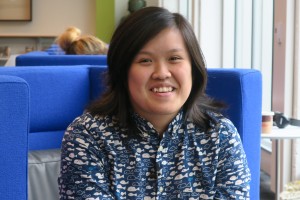
For her junior-year internship this past summer, Judie Thai ’19 put down the game controller and picked up some cards.
The Animation & Game Arts senior learned the ins and outs of creating a board game while interning at Cardboard Fortress Games in Philadelphia, a company owned by Nicole and Anthony Amato. The Amatos are game designers who are heavily involved in the tabletop game community, both locally and nationwide.
“It didn’t feel like an internship, it was more like a mentorship,” Thai said of working closely with the Amatos. “My goal for the summer was to create a tabletop game from start to finish and do some of the marketing involved with that.”
MEET THE AMATOS
Thai was awarded one of five Penny Fox Internship Fellowships at Moore’s Honors Convocation in April 2018. A generous gift from Penny Fox, chair emerita of Moore’s Board of Trustees, and her husband, Bob, the competitive Fox Internship Fellowships provided $5,000 to each of this year’s awardees. The fellowship money made it possible for Thai to buy a new laptop and game development software that will carry her beyond graduation.
“I wanted to be really attractive to independent video game developers, because oftentimes within small studios, you have to wear multiple hats,” Thai said. “I wanted to get better at game design, and that is really thinking about how the rules of the game come together and provide a certain experience for the player.”
Thai met Nicole Amato a couple of years ago when Thai was a student in Amato’s History of Game Art and Animation class at Moore. She contacted the Amatos this year when she decided she wanted to learn more about designing a board game.
“I was really fluent in video games, but when it came to doing anything related to tabletop games, I didn’t have a lot of experience,” Thai said. “I had to do a lot of research on different game mechanics and genres of tabletop games and see what was successful.”
Nicole Amato said there are big differences between developing a board game and a video game.
“With video games, if you want to show someone your game, you just have to make a demo, you don’t have to have the whole thing done,” she said. “With board games, you have to have the whole game done, you have to have the mechanics working.”
“For instance, most people, when they hold cards, they splay them with the top card on the right,” said Anthony Amato, a graphic designer who does the artwork for Cardboard Fortress. “You want to make sure that any info that you want on the card that people will see should be on the left side of the card and top left corner.”
SKY HIGH CACTI
Thai came up with the game Sky High Cacti, a competitive strategy game in which two to four players try to grow their cacti by obtaining water cubes while other players try to block the growth. Players draw cards to determine their next move. Competitors can call upon animals of the desert to sabotage the others’ plants. A player wins when they’ve grown the biggest cactus.
Nicole Amato said the hardest part about mentoring Thai was teaching her how to make rules for the game.
“Making rules is really hard,” Amato said. “You vacillate between, ‘No, this is too obvious a thing to say in the rule,’ and ‘Oh my god, are people smart enough to know how to pick a card up.’”
Through her relationship with the Amatos, Thai was able to play-test an early version of Sky High Cacti with members of the Philadelphia Game Makers Guild at Redcap’s Corner, a game shop in the Powelton Village section of Philadelphia. Thai divvied up cards and game pieces to several members of the Guild in August.
“When you’re doing video game programming, a lot of the time programming gets in the way of testing: Is this working? Is this fun? Is this what I wanted to do?” Thai explained. “In tabletop game design, the process to get the game design going and to test out the rules and the game mechanics goes by a lot faster because you can just simply write rules on the cards on physical prototypes and then really test it out quick and easy.”
Her mentorship relationship with the Amatos led to taking her game to a bigger stage in September – Keystone Comic Con at the Pennsylvania Convention Center.
“I got to bring a game, set up a table, show the game to people and actually do some play testing,” she said. “If I were to do this internship somewhere else, I strongly believe this wouldn’t have happened.”
Thai said the whole process was enlightening and rewarding.
“This internship prepared me for my future because it’s making me a lot more flexible in what I can do as an artist and as a game designer,” she said. “The kinds of design lessons I learned in my mentorship can be readily applied in my video game endeavors.”
“I see her in a really good indie studio doing some amazing things,” said Nicole Amato.
